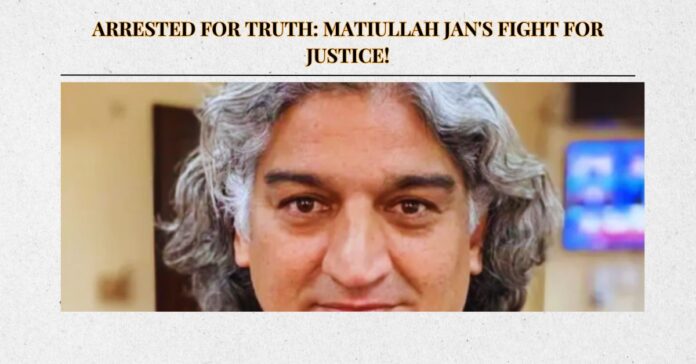
The Arrest of Matiullah Jan and the Outcry
Prominent journalist Matiullah Jan has been arrested under shocking and controversial charges. Known for his critical stance on the military’s influence in Pakistani politics, Jan was investigating casualties from a protest demanding the release of imprisoned former Prime Minister Imran Khan. His claims, which contradicted government narratives about protester deaths, likely fueled the decision to arrest him late Wednesday, sparking outrage among human rights organizations and media advocates.
The Arrest and Charges
On November 28, 2024, Matiullah Jan was taken from the parking lot of the Pakistan Institute of Medical Sciences (PIMS) in Islamabad. His colleague, Saqib Bashir, recounted how both were blindfolded and abducted by unidentified men in black uniforms while collecting data on protest casualties.
Authorities charged Jan with terrorism, narcotics possession, and attacking the police. An FIR alleged he was caught with 246 grams of methamphetamine near Islamabad’s E-9 area. Jan dismissed the allegations as “fake, funny, and fabricated.” His lawyer, Imaan Zainab Mazari, argued the charges were baseless and aimed at silencing his investigative work.
Court Proceedings: A Glimmer of Hope
The Islamabad High Court (IHC) suspended Jan’s two-day physical remand in a landmark decision on Friday. Advocates Mazari and Hadi Ali Chattha exposed discrepancies in the FIR and questioned the lack of evidence.
- Key Court Highlights:
- The IHC deemed the FIR vague and insufficient to justify physical remand.
- Jan was transferred to judicial custody.
- Advocate Mazari urged swift hearings to prevent further injustice.
This court action shines a light on the potential misuse of anti-terrorism laws to stifle dissent.
Reactions from Rights Organizations
The arrest drew swift international condemnation:
- Amnesty International: Termed the arrest “an affront to media freedom” and demanded Jan’s release.
- Committee to Protect Journalists (CPJ): Called the charges “a direct assault on press freedom” and linked them to Jan’s investigative reporting.
- Domestic journalist unions labeled the arrest an attempt to intimidate and silence independent reporting.
Matiullah Jan’s Investigative Work: A Dangerous Truth
Before his arrest, Jan had been challenging the official narrative surrounding protests supporting Imran Khan. Live TV broadcasts showed Jan presenting hospital records that contradicted government denials of live ammunition usage and protester deaths.
- Government Claim: Four security officers died, with some reportedly run over by vehicles.
- PTI Allegations: Protesters claim that 8 to 40 individuals were killed and hundreds injured by police violence.
Jan’s revelations, undermining the state’s narrative, likely contributed to his arrest.
Allegations in the FIR
Jan’s son, Abdul Razzaq, reported his father’s abduction from the PIMS parking lot. Filed by SP Asif Ali, the FIR accused Jan of narcotics possession and intoxication. However, advocates noted several contradictions:
- No solid evidence of narcotics transactions.
- Vague allegations with no credible links to terrorism or substance possession.
Broader Implications for Media Freedom
Matiullah Jan’s case underscores the escalating threats to journalists in Pakistan. Amnesty International and CPJ highlighted how tactics like these chill investigative reporting and undermine press freedom.
Critics argue the government’s actions are part of a broader crackdown on dissenting voices, creating an increasingly hostile environment for independent media.
What’s Next for Matiullah Jan?
Jan remains in judicial custody as his legal team, led by Imaan Mazari, fights for bail. With mounting pressure from global watchdogs and the local journalism community, the spotlight is now on Pakistan’s judiciary to ensure justice.
His case has become a rallying cry for protecting press freedoms in the country, with growing demands for a halt to politically motivated charges.
Conclusion: Upholding Truth and Press Freedom
The arrest of Matiullah Jan represents a critical moment for journalism in Pakistan. His fearless investigation into sensitive topics highlights the essential role of the media in holding authorities accountable.
With international bodies and the media community rallying behind him, Jan’s case remains a litmus test for Pakistan’s commitment to democratic values. Releasing Jan and ensuring a free press is not just a necessity—it’s the cornerstone of a thriving democracy.

